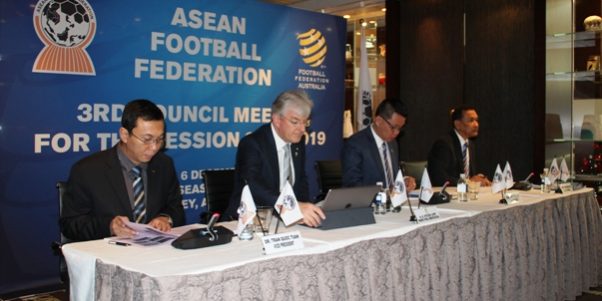SYDNEY (6 Dec 2015) – The Myanmar Football Federation (MFF) will be hosting three AFF events in 2016.
Other than the blue-riband event of being co-host of the AFF Suzuki Cup alongside the Philippines, the MFF have also confirmed their hosting of the AFF Women’s Championship (24 July to 5 August 2016 in Mandalay) and also the AFF Futsal Club Championship (7-16 July 2016 in Yangon).
In the meantime, the Vietnam Football Federation (VFF) have come forward to host the AFF Beach Soccer (dates to be confirmed) and also either the AFF Under-16 or the AFF U-19.
The FA of Malaysia (FAM) have expressed their intention to host the AFF U16 considering that they have qualified for the AFC U16 Championship in 2016.
Prior to that, Sultan Haji Ahmad Shah, the president of the AFF, in his speech that was delivered by Major General Khiev Sameth, the vice president of the AFF, reminded member countries to always uphold the trust that has been placed on them as stakeholders of football.
“I am alarmed by a series of suspensions which have taken place lately by FIFA,” said Sultan Ahmad. “As ambassador of football, it is our duty to uphold the game and not betray the trust that has been given as stakeholders.”
Steven Lowy, the president of the Football Federation Australia, in his welcome speech said that football in Australia is changing and that the country is willing to play a greater part to help football grow in the ASEAN region.
“Migration has enriched the country and the face of Australian football is changing,” said Lowy.
“Australia are embracing Asia at every level and we are willing to play our part to help football grow as a member of ASEAN.”
In the meantime, a briefing was held in the afternoon from the FFA on the lessons from their organization of the Asian Cup in 2015 which could be of use for the AFF Suzuki Cup this year.
Mark Falvo, the head of FFA’s International Affairs, who was also the Chief Operating Officer for the Asian Cup 2015, pointed out on the need to prepare early for any major tournament.
“The advantage that we had was that the award to give Australia the hosting job was made back in 2011 which allowed us to prepare early for the event,” said Falvo.
“And the fact that we had stadia around the country up to a certain standard meant that we did not have to spend millions on new facilities but channel the available fund to the operations and the successful hosting of the Asian Cup.”
Falvo went on to explain the various aspects of organizing the Asian Cup from security to infrastructure and from ticketing to the needs of getting the various communities in Australia to get involved.
One of the lasting after-effects of the Asian Cup was the continued legacy of the Mini Roos which is still being used in A-League matches to further develop age-group football at the grassroots.

 Australia
Australia Brunei
Brunei Cambodia
Cambodia Indonesia
Indonesia Laos
Laos Philippines
Philippines Myanmar
Myanmar Malaysia
Malaysia Singapore
Singapore Thailand
Thailand Timor Leste
Timor Leste Vietnam
Vietnam










